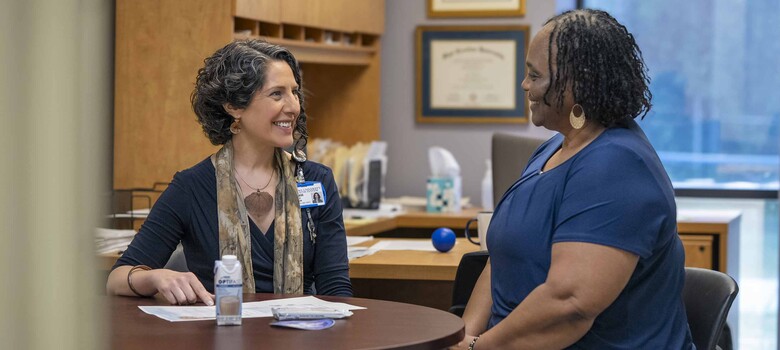 From the DukeHealth.org archives. Content may be out of date.
From the DukeHealth.org archives. Content may be out of date.
Weight Loss Leads to Successful Liver Transplant, Better Health

David Tedrow is doing great after undergoing a liver transplant at Duke.
At nearly 100 pounds overweight and suffering from severe liver disease, David Tedrow could not get the life-saving transplant he desperately needed until he lost weight. He turned to the Duke Diet and Fitness Center for help. “The Diet and Fitness Center saved my life,” he said.
Obesity Leads to Liver Disease
David Tedrow started gaining weight in his mid-30s and tried “every diet in the known world” to lose it. He discovered he had liver damage after undergoing weight loss surgery in 2008.
Tedrow was diagnosed with nonalcoholic fatty liver disease (NAFLD), a condition that affects about 30 percent of the population explained Manal Abdelmalek, MD, a liver disease specialist at Duke. It’s becoming more common as obesity, diabetes and metabolic syndrome become more prevalent.
Nonalcoholic fatty liver disease is a spectrum of liver disease that occurs in patients who don't drink significant amounts of alcohol. It starts with the presence of fat in the liver and can progress to chronic inflammation, fibrosis (scarring), and ultimately cirrhosis with potentially life-threatening complications in a minority of people, Dr. Abdelmalek explained. “There are no hallmark signs or symptoms. Many patients don’t even know they have fatty inflammation of the liver," she said.
A Friend Told Tedrow: ‘Go to Duke’
Tedrow spent several years in denial. “I didn’t think anything was wrong with me,” he said. Eventually, his liver could no longer clear toxins from his bloodstream and he developed confusion, a condition known as hepatic encephalopathy.
“My brain was going downhill,” he said. “I forgot simple things. I’d be standing in the kitchen with the bread and the mayonnaise and forget how to make a sandwich. I forgot how to get out of a car. I forgot how to make change. And I was running a jewelry store. It was horrible.”
Tedrow contacted the liver disease specialists at Duke after a friend told him to go to Duke for his care. “Dr. Abdelmalek is great. She really helped me understand what was happening.”
Weight Loss Key to Good Transplant Outcomes
By 2013, Tedrow’s liver had deteriorated to the point where he needed a liver transplant to survive. He sold his store on Pawleys Island, SC, and moved to Durham. However, his biggest obstacle remained his weight. Doctors wouldn’t consider him for a liver transplant until his body mass index (BMI) was under 40.
“It was very important for him to lose the weight so the transplant surgery can be performed safely, and the outcomes can be optimal,” Dr. Abdelmalek explained. “The less obese a patient is, the more likely they will heal better and have fewer complications after transplant surgery. That is why those cutoffs are created.”
Dr. Abdelmalek said many patients with obesity and fatty liver disease are challenged by weight loss. “It can be an unachievable goal without sustained, lifelong lifestyle modifications,” she said.
Tedrow thought he had done everything he could to lose weight. But knowing he had to try harder, he decided to research his options further. “The Duke Diet and Fitness Center kept coming up. I said, ‘gee whiz, I live here now. This might be a real blessing.’”
Achieving Weight Loss Success
Tedrow’s preconceived notions that the Diet and Fitness Center was a “spa where you sit around and do a little exercise, eat gourmet food, and watch the fat melt off” quickly met with reality.
“You’ve got to figure this whole thing out,” he said. “It’s your life. The Duke Diet and Fitness Center taught me how to eat, how to exercise, how to make good decisions about what I do. It was like a massive information overload. I started losing weight because I was eating better; I was exercising. I was learning why it was working. And that has been the single most important thing for me, with the exception of getting a new liver.”
Living Differently After Transplant, Weight Loss
Within five weeks at the Duke Diet and Fitness Center, Tedrow had reached his goal BMI. He was listed for a liver transplant in November 2013 and underwent the surgery the following spring.
“This makes you live life a little differently,” Tedrow said of his lifelong need for immunosuppressant therapy, which prevents his immune system from attacking his new liver.
Now, Tedrow considers himself “the healthiest person on the face of the earth. Being alive is wonderful. This is a year I wasn’t supposed to have.”


